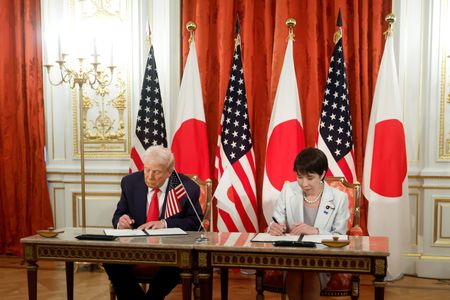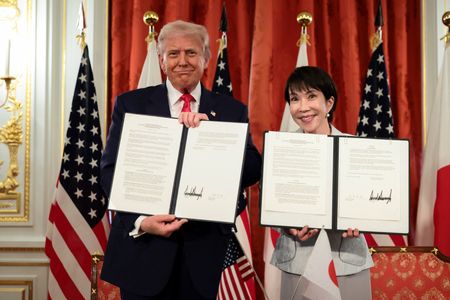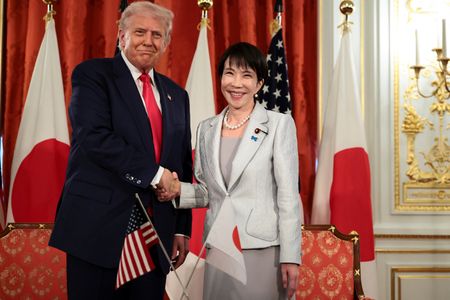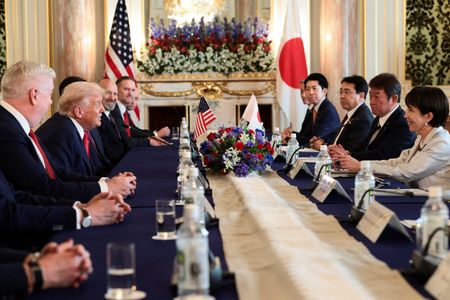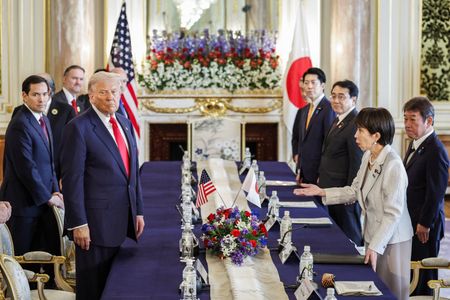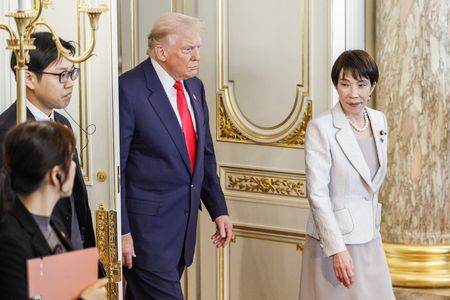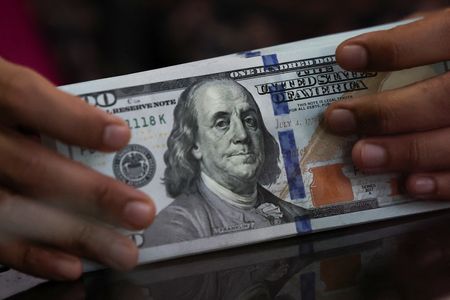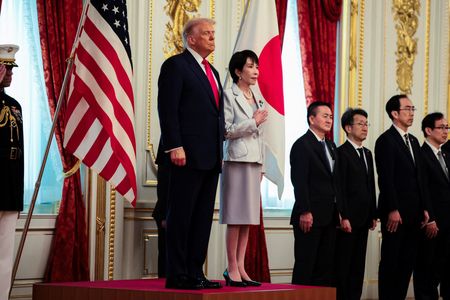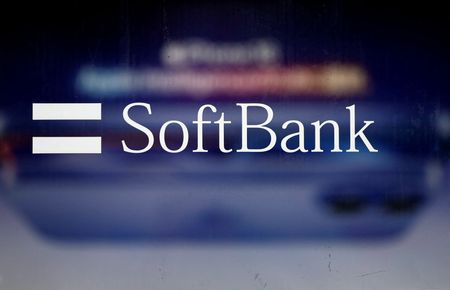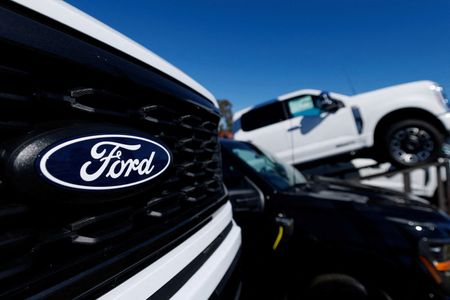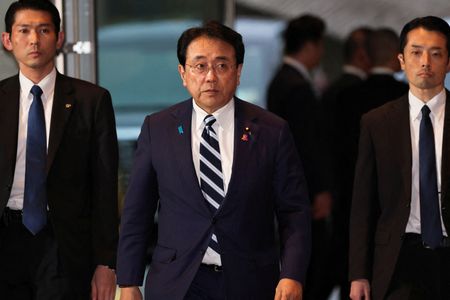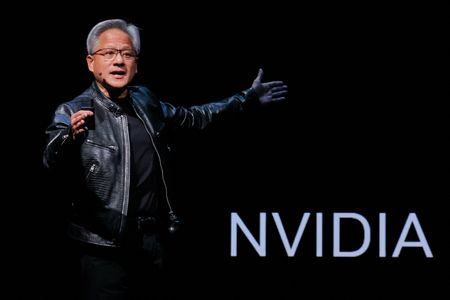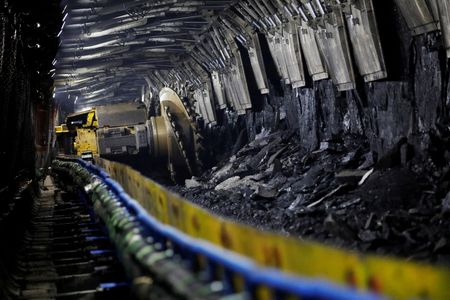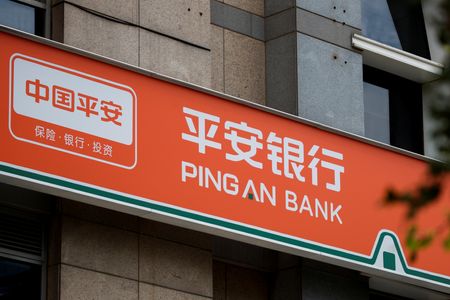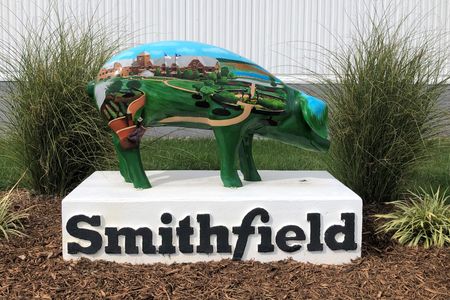By Trevor Hunnicutt, Tim Kelly and John Geddie
TOKYO (Reuters) -U.S. President Donald Trump lavished praise on Japan’s first female leader Sanae Takaichi in Tokyo on Tuesday, welcoming her pledge to accelerate a military buildup and signing deals on trade and rare earths.
Takaichi, a protegee of Trump’s late friend and golfing buddy Japanese leader Shinzo Abe, applauded Trump’s push to resolve global conflicts, vowing to nominate him for the Nobel Peace Prize, according to Trump’s spokeswoman, Karoline Leavitt.
Both governments released a list of projects in the areas of energy, artificial intelligence and critical minerals in which Japanese companies are eyeing investments of up to $400 billion in the U.S.
Tokyo pledged to provide $550 billion of strategic U.S. investments, loans and guarantees earlier this year as part of a deal to win a reprieve from Trump’s punishing import tariffs.
Those gestures may temper any Trump demands for Tokyo to spend more towards its security in the face of an increasingly assertive China, calls that Takaichi sought to head off by promising to fast-track plans to increase defence spending to 2% of GDP.
“Everything I know from Shinzo and others, you will be one of the great prime ministers,” Trump told Takaichi as they sat down to discussions, accompanied by their delegations, at Tokyo’s Akasaka Palace.
“I’d also like to congratulate you on being the first woman prime minister. It’s a big deal,” Trump added.
TAKAICHI INVOKES ABE LEGACY
Takaichi repeatedly referred to Abe’s affection for Trump and gifted him the former prime minister’s putter encased in glass, a golf bag signed by Japanese major winner Hideki Matsuyama and a gold-leaf golf ball, photographs posted on X by Trump’s assistant Margo Martin show.
Abe, who was assassinated in 2022, was the first foreign leader to meet Trump after his 2016 election victory and the two went on to forge a close bond over several rounds of golf in the United States and Japan.
Over a lunch of U.S. rice and beef, and vegetables from Takaichi’s hometown of Nara, she presented Trump with a map of major investments Japanese firms have made in the United States since his last visit in 2019.
Japanese companies on the list of possible future investors included Mitsubishi Heavy Industries, Softbank, Hitachi, Murata Manufacturing and Panasonic, among others.
Japanese carmaker Toyota would also open auto plants in the United States to the tune of $10 billion, Trump said.
Toyota did not immediately respond to a request for comment.
DEAL ON CRITICAL MINERALS
Trump praised Japan’s efforts to buy more U.S. defence equipment, while Takaichi said his role in securing ceasefires between Cambodia and Thailand, and Israel and Palestinian militants, was an “unprecedented” achievement.
They signed a deal to bolster supplies of critical minerals and rare earths, as their nations seek to reduce China’s dominance of some areas of key electronic components.
After lunch, Trump met relatives of people abducted by North Korea in the 1960s and 1970s. While some were later repatriated, Japan continues to press Pyongyang for a full accounting of all the abductees and the return of any who remain alive, a cause championed by Abe.
“The United States is with them all the way,” Trump told reporters after greeting the families. He has repeatedly said he was open to meeting North Korea’s reclusive leader Kim Jong Un during his five-day Asia visit.
The U.S. leader began his trip in Malaysia on Sunday, before traveling to Japan late on Monday to receive a royal welcome at the Imperial Palace.
He hopes to cap off his trip, his longest overseas journey since returning to the White House in January, by agreeing a trade war truce with Chinese leader Xi Jinping in South Korea on Thursday.
VISIT TO U.S. NAVAL BASE
Takaichi’s efforts to invoke Abe’s legacy to forge a bond with Trump could help bolster her weak political position at home and help her navigate Trump’s at times erratic decision-making, analysts said.
Though she has seen a surge in public support since becoming prime minister, her coalition government is two votes shy of a majority in parliament’s lower house.
Trump and Takaichi later flew on his presidential helicopter to the nuclear-powered U.S. aircraft carrier George Washington, docked at the Yokosuka naval base near Tokyo.
There Trump delivered an hour-long speech that ranged from topics such as the U.S. southern border and inflation to American football and the possibility of deploying “more than the national guard” to “troubled” U.S. cities.
Flanked by two fighter jets, Trump ushered Takaichi up on stage before 6,000 U.S. sailors.
“This woman is a winner,” he said, before Takaichi thanked the forces for helping defend the country and the region. Japan hosts the largest concentration of U.S. military power abroad.
Delivery would begin this week on Japan’s long-awaited order of U.S. missiles for F-35 fighter jets, Trump added.
“I told the president that I want to work with him to build a new chapter in the Japan-U.S. alliance that will make both countries stronger and more prosperous,” Takaichi told reporters after returning to Tokyo.
U.S. Secretary of Defense Pete Hegseth is due to hold talks with his Japanese counterpart Shinjiro Koizumi on Wednesday.
Trump will meet business leaders in Tokyo later on Tuesday, before travelling on Wednesday to South Korea to meet President Lee Jae Myung ahead of his Thursday summit with Xi.
(Reporting by Tim Kelly, Trevor Hunnicutt, John Geddie, Mariko Katsumura; Editing by Lincoln Feast, Clarence Fernandez and Kim Coghill)

